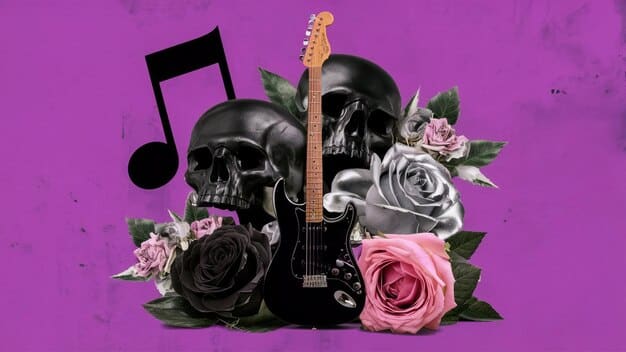Rock Stars Advocate: Mental Health in Music Interviews

Rock musicians are increasingly using their platforms to discuss mental health, sharing personal struggles and advocating for support in recent interviews.
The rock and roll lifestyle, often glamorized, can take a significant toll on mental health. Recently, many rock musicians have been opening up in interviews about their personal struggles, shedding light on the importance of addressing mental health within the music industry. What Rock Musicians are Saying About the Importance of Mental Health in Recent Interviews reveals a growing awareness and a push for more support.
The Stigma Around Mental Health in the Music Industry
For years, the music industry, particularly rock and roll, has fostered a culture where vulnerability is often seen as weakness. This perception has made it difficult for musicians to openly discuss their mental health challenges. However, a shift is occurring as more artists break the silence and share their experiences, working to dismantle the stigma.
The Pressure to Maintain a Persona
Rock musicians often feel immense pressure to uphold a certain image or persona. This can lead to suppressing emotions and avoiding discussions about mental health, fearing it may tarnish their public image.
- Fear of alienating fans.
- Concerns about losing endorsements.
- Worry over being perceived as “weak.”
The Isolation of Touring
Touring can be incredibly isolating. Being away from family and friends, coupled with irregular sleep schedules and constant travel, can exacerbate mental health issues. The lack of a stable routine and support system contributes to feelings of loneliness and anxiety.

The environment backstage and on the road can often be very stressfull, and is not always a very conducive environment to be in in regards of mental health.
Personal Accounts: Rock Musicians Sharing Their Stories
Several prominent rock musicians have recently shared their personal experiences with mental health, providing insight into their lives and struggles. These accounts have helped to normalize conversations around mental health and encourage others to seek help.
Brandon Flowers (The Killers)
Brandon Flowers, the frontman of The Killers, has spoken about his struggles with obsessive-compulsive disorder (OCD) and anxiety. He has emphasized the importance of therapy and medication in managing his mental health.
- Discusses the challenges of performing with anxiety.
- Highlights the role of therapy in his life.
- Advocates for open conversations about mental health.
Hayley Williams (Paramore)
Hayley Williams of Paramore has been candid about her battles with depression and anxiety. She has used her platform to encourage fans to prioritize their mental well-being and seek professional help when needed. She has openly discussed taking time away from music to focus on healing and self-care.

She also often speaks about how she needs to take big steps back from her career in order to keep a better view over her life.
The Impact of Substance Abuse on Mental Health
Substance abuse often goes hand in hand with mental health issues in the rock music scene. Many musicians turn to drugs and alcohol to cope with stress, anxiety, and depression, which can lead to a cycle of addiction and deteriorating mental health.
The Destructive Cycle of Addiction
Using substances to self-medicate can provide temporary relief but ultimately worsen mental health problems. Addiction can lead to isolation, financial instability, and further emotional distress.
There are many reasons why someone might turn to sustances in times of emotional distress, mainly because it offers a sense of peace, even if only temporary.
Recovery and Finding Support
Many rock musicians have found recovery through therapy, support groups, and rehabilitation programs. Sharing their stories of overcoming addiction has inspired others to seek help and break free from the cycle of substance abuse.
Creating a Supportive Environment in the Music Industry
To address the mental health crisis in the music industry, there is a need for creating a more supportive and understanding environment. This includes promoting mental health awareness, providing access to resources, and fostering open conversations.
- Implementing mental health programs for musicians.
- Offering affordable therapy and counseling services.
- Encouraging peer support and mentorship opportunities.
The Role of Record Labels and Management
Record labels and management teams have a responsibility to prioritize the mental health of their artists. This involves providing support, understanding, and access to resources that can help musicians cope with the pressures of the industry.
However, they also need to take a step back and see if the issue comes from working with them. Is it the pressure, or the goals, that they are inflicting on the artists?
The Importance of Peer Support
Musicians can provide invaluable support to one another by sharing their experiences and offering encouragement. Creating a community where artists feel comfortable discussing their mental health can reduce isolation and promote well-being.
Advocacy and Awareness Campaigns
Several organizations and advocacy groups are working to raise awareness about mental health in the music industry. These campaigns aim to break the stigma, provide resources, and promote the importance of seeking help.
Many online communities are also offering help and guidance.
Mental Health America (MHA)
Mental Health America (MHA) is a national non-profit organization that addresses all aspects of mental health and mental illness. They provide resources, support, and advocacy to individuals and groups across the United States.
When someone is dealing with their mental health alone, it can be a rough experience, but fortunately this doesn’t have to be the case.
The Jed Foundation
The Jed Foundation is a non-profit organization that protects emotional health and prevents suicide for teens and young adults. They partner with high schools and colleges to strengthen their mental health programs and systems.
Moving Forward: Prioritizing Mental Health in Rock Music
The increasing openness surrounding mental health among rock musicians is a positive step towards creating a healthier industry. By continuing to share their stories, advocate for support, and prioritize their well-being, musicians can inspire others to do the same.
It’s important to remember to always be supportive.
Encouraging Open Dialogue
Continuing to encourage open dialogue about mental health is crucial. By creating a safe and supportive environment, musicians and industry professionals can feel more comfortable discussing their struggles and seeking help.
| Key Point | Brief Description |
|---|---|
| 🎤 Speaking Out | Musicians are sharing mental health struggles publicly in interviews. |
| 💔 Stigma | Breaking down the stigma around mental health in the rock scene remains very important. |
| 🫂 Creating Support | Promoting supportive environments within the music industry. |
| 💪 Advocacy | Organizations like MHA and The Jed Foundation are helping to provide support and guidence to these musicians. |
FAQ
▼
More rock musicians are opening up about mental health to break the stigma, share personal struggles, and encourage others to seek help. This increased visibility helps normalize conversations around mental well-being.
▼
Musicians often struggle with anxiety, depression, substance abuse, and the pressures of fame. The irregular lifestyle and isolation of touring can exacerbate these issues. Constant public scrutiny also has an impact.
▼
The music industry can provide resources like affordable therapy, implement mental health programs, and foster open dialogue. Record labels and management can prioritize artists’ mental health by being understanding and supportive.
▼
Peer support is crucial for rock musicians, as it provides a community where they can share experiences and offer encouragement. Knowing they’re not alone in their struggles can reduce isolation and promote better mental health.
▼
Organizations like Mental Health America and The Jed Foundation offer resources, support, and advocacy for mental health. Many online communities and therapy services cater specifically to musicians’ unique needs.
Conclusion
The evolving discourse around mental health among rock musicians signifies a positive shift within the industry. By openly sharing their struggles and advocating for support, these artists are inspiring others to prioritize their mental well-being and seek help when needed, creating a healthier and more compassionate music community.





